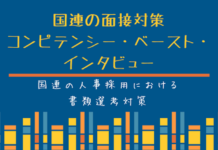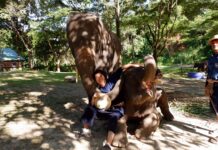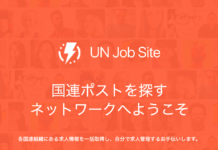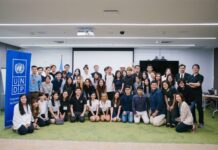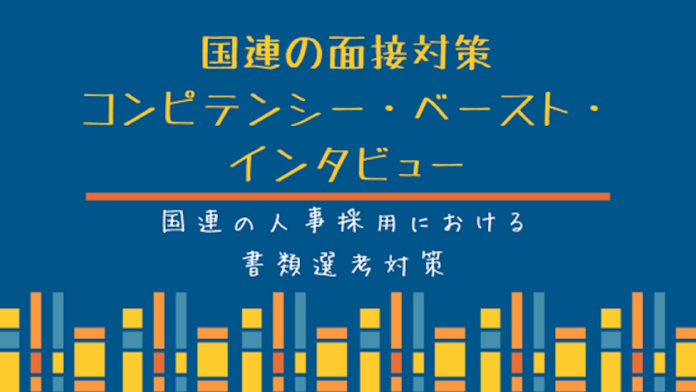前回の記事である「国連人事の仕組み:コンピテンシーベーストインタビューについて(国連の面接対策)」にて、コンピテンシー・ベースト・インタビューの概要を述べました。
実際にどのような対策をすべきかも理解して頂けたのではないかと思います。今回は、コンピテンシー・ベースト・インタビューの準備をする際に必見の動画の紹介です。この記事でどのように準備をすれば良いかさらに理解を深めていただければと思います。
関連記事 >> 「国連人事の仕組み:コンピテンシーベーストインタビューについて(国連の面接対策)」
関連記事 >> 「国連面接試験におけるコンピテンシーとは?(コンピテンシー・ベースト・インタビュー)」
面接前に一度はマイケル・エミリーの動画を見るべし
こちらがその彼の動画です。私も実際に彼に会いましたが、この動画の印象そのままの人で、かなり気さくな人でした。
この動画のポイント
- コンピテンシー・ベースト・インタビューの原則は「過去にそのコンピテンシー(能力・資質)を発揮することができたのであれば、将来も発揮できる」。
- 原則的に過去の話を聞かれる。例えば、「過去に経験した成功したチームの話を教えてください。その時のあなたの役割を教えてください。」、「どうやってそのチームで困難を乗り越えましたか」と言った質問が例としてあげられる。
- 空席情報のコンピテンシーをチェックすべし。なぜなら殆どの国連は空席情報にコンピテンシーを表示しているから。
- CARLの原則を考慮に入れることが推奨される。Context, Actions, Results, Learned. その状況の簡潔な説明、個人として行った行動、そしてその行動を行ったことによる結果や影響。これにその経験によって学んだことを述べることも。
- 面接官は次に述べることを求めている。「emotionally stable」、「likable and agreeable」、そして「a good fit for the position and a good fit for the organization」。
- インタビューは(当時)電話で行うことが多いが、面接をする際に「立って」質問に答えることをお勧めする。立って面接を受けることで、声が座っている時よりもしっかりと伝わるから。
- 面接の際、「pitch, tone, speed and silence」を活かすこと。
- 対面の面接の際は、しっかりとウォームアップをして、しっかり準備をしておくこと。面接官は最初の40秒で候補者のこと色眼鏡で見始めるので、最初の印象がとにかく重要だ。
- 面接官はEnthusiasmを求めている。答える時にそのEnthusiasmをしっかりと入れること。
- 面接官はコンピテンシー・ベースト・インタビューに入る前に簡単な質問をする時がある。例えば、どうしてそのポジションに応募したのかといったモチベーションに関する質問。一見簡単そうな質問だけれども、上記で述べたように面接官は最初の40秒が重要。
- CV(PHP)をなぞるだけの答えはしないように。
- コンピテンシーの質問は大体5〜8つ聞かれる。その後、大抵は質問がないか聞かれる。
- 給料や福利厚生のことは聞くべきではない。なぜなら、それらは自分で調べればいくらでもわかるからだ。
- 質問をする代わりにいくつか追加の情報があるのかいいか聞くことも可能。もし、いいと答えたら、自分のさらにアピールできるポイントを答えればいい。
- コンピテンシー質問は大体、二つのタイプに分かれる。一つは「how you work in teams and how you resolve conflict」、二つ目はバリュープロポジションに関する質問、「what are the three values that are most important to you? And how do these values translate into your work」。これらの質問に候補者がうまく答えられないことがあるが、それはあくまで「考えたことがないから」起こることなので、しっかりと準備すれば問題ない。
- コンピテンシーの質問に答える際のポイントは二つ。「the depth of the example」と「the complexity of the example」。そして、よりcomplexな例をあげると、より高い得点を得られやすい。
- 例をあげる際に、正直であること。自分の功績をいうこと。例え自分がチームの一人でも、他のチームメンバーの功績を自分の功績のように言わないこと。
しっかりと準備をしましょう
マイケル・エミリーの話はとても有益に思える情報が多く含まれています。私も実際に立ちながらインタビューをした方が、思考もしっかりとしやすいですし、声もしっかり出せるのでとてもやりやすかったのを覚えています。
個人的には「録音をしながら、何回も発声しながら練習をする」のもお勧めします。たとえ文字に書いたとしても、自分で口に出すと何と無く気持ち悪く感じる文章が出てきます。自分の中でうまく論理的な整合性がついていないために起るか、まだその文章が自分の中で身についていない証拠でもあります。
自分の言葉で、その言葉の論理的なつながりを意識しつつ練習をして行くと、たとえ緊張していたとしても、割とスラスラ口から言葉が出てきます。
また、僕はいろんな方から声のトーンが重要だということも聞いています(マイケルエミリーも言っていますね)。ゆっくり、低い声で話すようにすると説得力があるように聞こえるので(またEmotionally Stableにも聞こえますので)、私の場合はこれを心がけています。
面接は本当に練習量がものを言いますので、しっかりと対策をしてのぞんで頂ければと思います。素晴らしい面接となるように祈っております。
国連に興味を持っている方は
国連で将来的に働きたいと考えている方は「国連職員になるには」の記事をご覧ください。特に国連職員になりたいけど、何を知るべきかわからないという方に向けて書いています。
関連記事 >> 「国連職員になるには」
他にも様々な記事を書いていますので、このブログ内にあるコンテンツに色々目を通していただければと思います。
以上「国連人事の仕組み:コンピテンシーベーストインタビューについて(国連の面接対策)」でした!
以下文字起こしです。ご参考になさってください。
文字起こし
Good afternoon everybody. My name is Michael Emery and I am the Director of Human Resources, at UNFPA and I’m here today to give you some insights into competency based interviewing.
Now, as you’re probably aware, most parts of the multi-lateral sector including the UN and UNFPA use competency interviewing to assess whether or not candidates are suitable for a certain position. And having sat through literally thousands of these interviews, I’m here to share with you some inside tips if you like on how to prepare properly for a competency interview.
Before we go into some of the tips, I want to talk a little bit about the basic premise of why we use competency interviewing. And the basic premise is that, if you can demonstrate that you can do the competency in the past, chances are that you’ll be able to do it in the future. So basically, if you’ve done it in the past, you’ll be able to do it in the future. And in terms of the research why this type of assessment is used, as a predictor of future performance, competency based interviewing or sometimes referred to as behavioral interviewing or situational interviewing is a .51 predictor of future performance, which is a very strong predictor, the only better predictor is a .54 predictor which is a trial period where you come in and you do an internship or a trial period as a trainee. So it’s a very strong predictor to see whether or not somebody will be able to perform in that role.
As a result, most of the questions that you get in a competency interview tend to be based on past experience. So it would be a question like, tell me about a time when you were part of a successful team, what made that team successful, what was your role in that team? How did you overcome problems in that team? And a good panel will be probing and delving and trying to get to the bottom of what your role was in that particular team.
Now in preparing for a competency interview therefore, the first point of reference is the vacancy announcement because in the vacancy announcements in UNFPA and most parts of the UN system, they will list the competencies that are most relevant for that position. So first tip, always print the vacancy notice when you apply for the job because invariably we interview you a month or two months later and the vacancy has gone off the net and you’re thinking, what were those competencies that were listed in the vacancy announcement? So please, that is the first tip, always print the vacancy notice, therefore you have a reference of how to prepare for a competency interview.
Now when you’re preparing for the interview, I like to encourage candidates to think of what I call the CAR principle, Context, Actions, Results. So when structuring your answers, you should be first of all giving a brief context, secondly, giving the actions that where attributable to you as the individual, not part of the team. And thirdly, and this is where a lot of candidates, they actually forget the third bit, is looking at the results or the impact of your actions. Sometimes they also throw in a fourth letter as well, which is L which stands for Learning. What learning did you draw from that experience?
And if you structure your answer in that way, then you’re giving the panel what they’re looking for. Subconsciously, the panel are looking for several things as well and the panel generally don’t even know this, they’re looking for people that are conscientious so you have to somehow rather project that conscientiousness in your interview. They’re looking for people that are emotionally stable, so you don’t want to come across as a nutter during the interview. They’re looking for people that are likable and agreeable and they’re looking for people that they feel will be a good fit for the position and a good fit for the organization.
So certainly in your preparation for an interview, you should be referencing the competencies, structuring your answers in the CARL context and be prepared to engage with the panel.
A couple of other tips, often in UNFPA and other organizations, we’re using telephone interviews. The tip I would have for you if you are given a telephone interview, is to stand up during the interview. You tend to project your voice a lot better when you’re standing up rather than sitting down.
Secondly, on a telephone interview, use pitch, tone, speed and silence to your advantage. You want to keep the panel that are on the other end of the phone awake and interested in your answers.
If you’re having a face to face interview, this is a completely different setup. It’s very important that you come in warmed up into an interview. There’s a lot of evidence to suggest that a very natural inclination for panel members is to make up their mind about a candidate within forty seconds of an interview starting. So you really do need to come in warmed up and ready to go. Certainly at various parts of the interview, the panel, different panel members will be asking questions. What I like to advise people is to address the panel member that asked the questions with the context part of your response and then bringing in the other panel members with eye movements, hand context, etc. The panel want people that are enthusiastic and you need to bring in that enthusiasm into your responses.
Now generally speaking, the way that a competency interview is structured, they tend to have what’s called an icebreaker question. And this is designed just to get you talking. They might say, how was your plane trip here today, was it busy at JFK? That’s just a general question to get you relaxed and get you talking.
Often then they will ask what seems to be a very simple question which is designed to ascertain motivation for the position, and this can be a question such as, why were you interested in applying for this job?, what particular aspect of this job appealed to you when you applied?, something like that. And this is a very, very important question because as I said, that first forty seconds is pretty important. This is where you need to come across and not just repeat what on your CV because the panel has read your CV. What needs to come across here is the value proposition that you bring to the organization and to this role. So what is it, what’s the intrinsic value proposition that you have that makes you a strong candidate for this position and that you want the panel to hire you for.
Then they would tend to go into the standard body of the interview where they are asking competency based questions. And that can be anywhere from five to eight structured competency based questions. And then they will typically wrap up the interview and give you the opportunity to ask questions as well.
Now this is often a bit of an awkward stage for candidates because they don’t know what type of questions they should be asking and I can guarantee you that I’ve been on a lot of panels where people have asked quite dumb questions, where they’ve blown a good interview and a dumb question.
Certainly in the multi-lateral context, you don’t need to be asking questions about benefits and entitlements, because you can look at that on the website. You should know that already.
I often counsel young candidates in particular that if I feel awkward about this part of the interview, one thing they can do is to say, look I don’t have any questions parse but I would like to provide some additional information, if that’s okay with the panel. And that’s where you have two or three minutes just to hit two or three really, really salient points about why you’re a good fit for this position and what’s your motivation for the position. Again you can reiterate that value proposition.
Invariably, in competency based interviews, you’re asked two types of questions. One is on how you work in teams and how you resolve conflict. So you need to really think about what it is, how you do work in teams and you need to have an example of when you’ve been able to resolve differences or conflict within a team when you’ve taken action about that.
Also, often, we ask questions on a value proposition. A typical question on a value proposition might be something like, what are the three values that are most important to you? And how do these values translate into your work. Now, that’s an interesting question because candidates at all ages tend to kind of be stuck on this question. It’s not because they don’t have a value system, it’s because often they haven’t really thought about what their value system is. Perhaps, that’s some thinking for you to look at after this video presentation. Think about what are the values that are important to me.
When the panel is assessing your answers in a competency interview, generally they’re looking for two specific things, one is the depth of the example and the complexity of the example and clearly the more complex the example that you’re giving, the higher the chances you have of scoring. It’s kind of like the diving in the Olympics, the more difficult the dive, the higher the possibility to get good marks.
Let me give you an example. I was interviewing for a position as a country director position and I asked the question, tell me about the time when you had to resolve a conflict between two colleagues or two sets of colleagues? And one of the respondents gave me in the example of having two interns in his office and they weren’t getting on and he had a chat with them, essentially he clunked their heads together and said you two better get on and he gave them a project to work on and they started working on it and now they’re really good friends. That’s a lovely example, nice result, nice impact but in terms of the complexity and the depth of that example, it’s not really at the level that we’re looking for for a country director.
Another candidate for the same position gave the example of an extremely volatile local staff issue in a country office where he’d worked where people were bringing AK-47s into the office. And he was able to setup a mediation and negotiation system in that office and worked through a very, very complex series of negotiations to try and resolve that issue. Clearly, that example had a lot more depth and complexity and he was able to score much higher on that example.
It’s also very important too that the examples that you give are actually attributable to you. I remember one particular interview when I asked the question, tell me about a time when you’ve led a communications campaign and what was the impact of that campaign? And I had a very eloquent candidate that said to me that she had led the campaign on the launch of some big report and that report had four million hits on the website and 16 op ed pieces on major newspapers etc. And I was looking at her CV as she was giving me this example and I realized that she was an intern in the office at that time, so I actually drilled down and I said, what was your specific role in this example and she says? Well mainly I was preparing the press releases and photo copying the press releases. So clearly she wasn’t leading the campaign, she was some back up support for that so she had misrepresented her level of contribution to that example. So you need to actually be quite honest in that because with reference checking etc. we can validate the extent to which your examples are actually true.
So to summarize, I would say you need to be ultra-prepared for an interview. You need to reference the competencies in the vacancy notice. You need to think about good examples and bad examples of the competencies that we’re looking at. Thinking about C A R and L, you need to be engaging with the panel whether that’s on a telephone interview or on a face to face interview. And you need to be thinking about the depth and the complexity of your examples. And you need to be thinking about the values or the motivation or the value proposition that you want to bring to the organization and to that role.
And if you’re prepared, the panel will appreciate it, you’ll feel much more confident and you have a much better chance of getting the job. Good luck with your next interview. Thank you.
「How To Prepare For Competency Based Interview At The UN 」より抜粋
以上、「国連の面接対策をする際にマイケル・エミリーの動画を見ましょう」でした。



